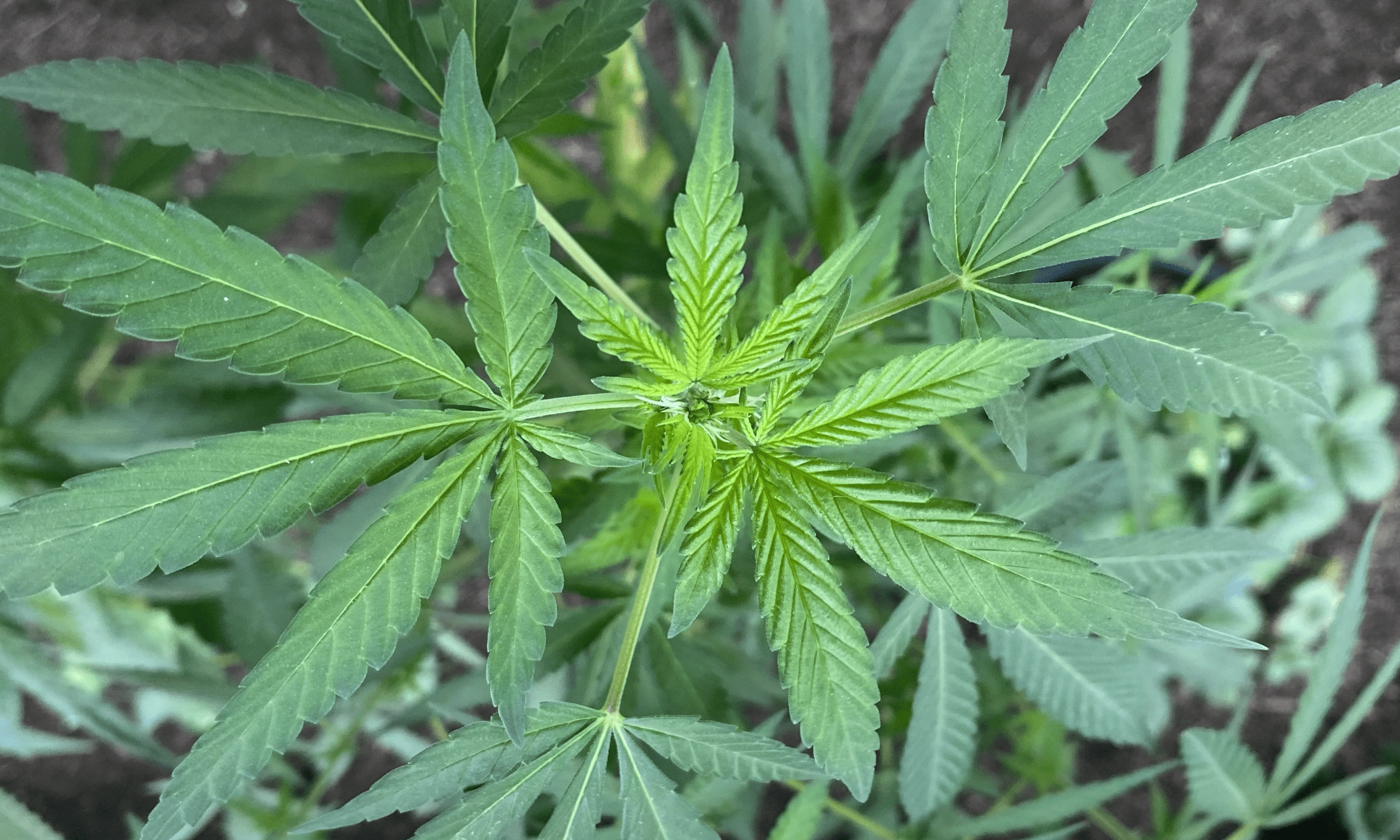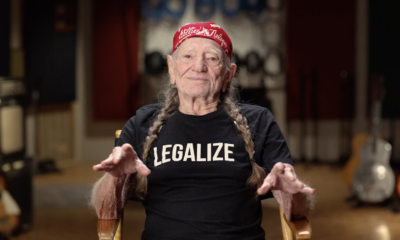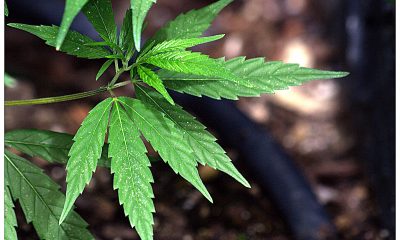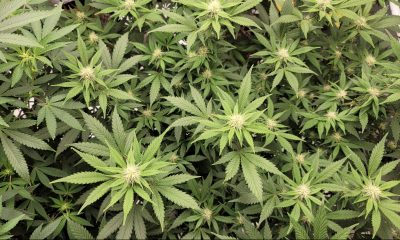Politics
Key House Committee Blocks All Pro- And Anti-Marijuana Reform Amendments To Defense Bill, Maintaining Ban On Testing Military Recruits For THC

A powerful House committee has blocked all proposed marijuana amendments—some that were pro-reform and others that were anti-reform—from floor consideration as part of a large scale defense bill. That means a measure included in the base bill to prevent military branches from testing recruits for cannabis as a condition of enlistment has been left intact, despite opposition from the White House.
The House Rules Committee took up the 2025 National Defense Authorization Act (NDAA) on Tuesday, declining to make in order any of the drug policy amendments such as a proposal to prevent security clearance denials based on past marijuana use.
Notably, the panel blocked an amendment to eliminate language included in the base bill, which advanced through the Armed Services Committee, that would prevent military branches for testing recruits for cannabis for enlistment or commission.
That measure to strip the section was sponsored by Reps. Robert Aderholt (R-AL), Mary Miller (R-IL), Josh Brecheen (R-OK), Andrew Clyde (R-GA), Gary Palmer (R-GA), Pete Sessions (R-TX) and Claudia Tenney (R-NY). An identical amendment was initially filed by Sessions alone last week, but it was withdrawn.
The language that remains intact in the NDAA bill reads:
SEC. 531 PROHIBITION ON CANNABIS TESTING FOR ENLISTMENT OR COMMISSION IN CERTAIN ARMED FORCES.
Subject to subsection (a) of section 504 of chapter 31 of title 10, United States Code, the Secretary of the military department concerned may not require an individual to submit to a test for cannabis as a condition of enlistment of such individual as a member, or the commission of such individual as an officer, of an Armed Force.
The section mirrors a proposed amendment to DOD appropriations legislation last year that was led by Rep. Matt Gaetz (R-FL).
Ahead of the markup on Tuesday, the White House Office of Management and Budget (OMB) put out a statement of administration policy that opposed the NDAA language, asserting that cannabis use is a “military readiness and safety concern.”
“Because Joe Biden was running out of ways to turn off young voters, he decided to oppose any cannabis reform that didn’t enrich big pharma,” Gaetz told Marijuana Moment on Tuesday after the OMB document was posted.
DOD told lawmakers last year that marijuana’s active ingredient delta-9 THC is the most common substance that appears on positive drug tests for active duty military service members. And several military branches have taken steps to loosen cannabis-related restrictions, including issuing waivers for recruits who test positive their first time.
Another amendment from Congressional Cannabis Caucus co-chairs Reps. Dave Joyce (R-OH) and Earl Blumenauer (D-OR) that was rejected by the Rules Committee on Tuesday would have required the secretary of defense to submit a report to Congress with a plan to “create, disseminate, and use a clear definition for the reenlistment waiver process” to clarify that the existing policy allows for such waivers to reapply for enlistment after testing positive for THC.
Of course, that reform wouldn’t be necessary if the bill is ultimately enacted with the broader cannabis testing ban provision in place.
The committee also declined to make in order an amendment from Rep. Robert Garcia (D-CA) that would have prevented military departments from denying security clearances to people based solely on their past marijuana use if it was in compliance with state law.
Members of the panel rejected another amendment from Reps. Tony Gonzales (R-TX), Jimmy Panetta (D-CA) and Joaquin Castro (D-TX) that would codify that military servicemembers can’t be penalized for using or possessing federally legal hemp products.
SEC. 5. USE OF LEGAL HEMP PRODUCTS BY MEMBERS OF THE ARMED FORCES.
(a) IN GENERAL.—The Secretary of Defense may not prohibit a member of the Armed Forces from possessing, using, or consuming a product containing hemp or any ingredient derived from hemp if such possession, use, or consumption is in compliance with applicable Federal, State, and local law.
(b) HEMP DEFINED.—In this section, the term ‘hemp’ has the meaning given that term in section 297A of the Agricultural Marketing Act of 1946 (7 U.S.C. 1639o).
Since hemp was federally legalized under the 2018 Farm Bill, multiple military branches have updated their policies around the use of products such as CBD. While some have simply cautioned about the risk of mislabeled products containing excess THC, others like the Navy and Air Force have outright banned the use of hemp regardless of its legal status.
The committee rejected a psychedelics-focused NDAA amendment from Reps. Madeleine Dean (D-PA) and Nancy Mace (R-SC) that would have created a streamlined process for the Drug Enforcement Administration (DEA) to move drugs designated as “breakthrough therapies” by the Food and Drug Administration (FDA) from Schedule I to Schedule II of the Controlled Substances Act (CSA), “which could help facilitate a phased roll-out of these potentially lifesaving therapies via FDA-approved Expanded Access pilot programs.”
The amendment text didn’t mention any specific drugs, but the summary specifically discussed MDMA and psilocybin as examples of such breakthrough therapies. This comes after an FDA advisory committee recommended against approving MDMA-assisted therapy for the treatment of post-traumatic stress disorder.
The Rules Committee also declined to make in order an amendment from Reps. Glenn Ivey (D-MD), Laurel Lee (R-FL), Mikkie Sherrill (D-NJ), Barry Moore (R-AL) and Kelly Armstrong (R-ND) to expand eligibility for expungements of non-violent drug convictions by removing an age restriction limiting relief to those who were under 21 at the time of the offense.
SEC. 17. ELIMINATING AGE REQUIREMENT FOR EXPUNGEMENT OF CERTAIN RECORDS OF DISPOSITION FOR SIMPLE POSSESSION OF CONTROLLED SUBSTANCES BY NONVIOLENT OFFENDERS.
Section 3607(c) of title 18, United States Code, is amended by striking ‘and the person was less than twenty-one years old at the time of the offense,’.
The panel additionally rejected an amendment to allow veterans to access state medical marijuana programs and eliminate a VA directive barring the department’s doctors from issuing cannabis recommendations.
The amendment is based on a standalone bill, the Veterans Equal Access Act, that Blumenauer has championed across multiple sessions. It’s advanced several times in committee and on the floor but has yet to be enacted into law.
While the Rules Committee didn’t allow it to advance as part of the NDAA, the reform was approved by the House last week as part of appropriations legislation covering Military Construction, Veterans Affairs and Related Agencies (MilConVA).
An amendment from Mace that the committee also rejected would have allowed military servicemembers to have their discharge upgraded to a general, rather than dishonorable, discharge if they were penalized based solely on a non-violent cannabis offense.
SEC. 5. AUTHORITY TO UPGRADE DISCHARGE ON THE SOLE BASIS OF A NONVIOLENT CANNABIS OFFENSE.
(a) AUTHORITY.—Pursuant to section 1552 or 1553 of title 10, United States Code, the Secretary concerned may grant a covered individual an upgrade of the characterization of the discharge or dismissal of such covered individual to a general discharge.
(b) DEFINITIONS.—In this section:
(1) The term ‘‘covered individual’’ means an individual—
(A) who was discharged or dismissed from an Armed Force solely on the basis of a nonviolent cannabis offense; and
(B) whose discharge or dismissal was characterized as other than honorable.
(2) The term ‘‘nonviolent cannabis offense’’ means a nonviolent offense or conviction that would not have satisfied all elements of the charged offense but for the involvement of marijuana or tetrahydrocannabinols. Such term does not include an offense or conviction under section 911 of title 10, United States Code (article 111 of the Uniform Code of Military Justice).
Another amendment from Mace that members previously adopted in committee added report language for the NDAA that would require DOD to issue a report on how many service members have been discharged due to marijuana.
The committee directs the Secretary of Defense to submit a report to the House Committee on Armed Services and the Senate Committee on Armed Services on the number of servicemembers discharged from service on the sole basis of marijuana use not later than December 1, 2024. The report shall include the total number of servicemembers discharged over the previous ten years, the number discharged by year, and the state or location these service members resided at the time of discharge.
An additional amendment from Rep. Steven Horsford (D-NV) that was adopted by the panel would require a DOD briefing on sentencing for cannabis-related offenses under the Uniform Code of Military Justice.
Briefing on Sentencing of Cannabis-Related Offenses Under the Uniform Code of Military Justice In 2019, the U.S. Government Accountability Office reported that some disparities exist in different stages of the military justice process, including at courts-martial. The committee acknowledges and commends the Department for its numerous initiatives to address identified disparities and to reform the Uniform Code of Military Justice, including by implementing sentencing parameters pursuant to section 539E(e) of the National Defense Authorization Act for Fiscal Year 2022. The committee further recognizes that the U.S. Drug Enforcement Administration has agreed with the Department of Health and Human Services’ recommendation to reschedule Cannabis from Schedule I to Schedule III of the Controlled Substances Act.
To better understand potential disparities in sentencing outcomes for cannabis-related offenses, the committee directs the Secretary of Defense, in coordination with the Secretaries of the military services, to provide a briefing to the House Committee on Armed Services not later than January 31, 2025, on the following:
1) the number of convictions, broken down by service, for cannabis use for the last four fiscal years, disaggregated by time in service, rank/grade, sex, race, and ethnicity;
2) the number of convictions, broken down by service, for cannabis possession for the last four fiscal years, disaggregated by time in service, rank/grade, sex, race, and ethnicity;
3) the number of convictions, broken down by service, for cannabis use and possession, for the last four fiscal years, disaggregated by time in service, rank/grade, sex, race, and ethnicity; and
4) for each of the categories listed above, an assessment of whether any disparities exist based on time in service, rank/grade, sex, race, or ethnicity in the reviewed sentencing of servicemembers, broken down by service.
Mace has also touted a separate amendment that she said “supports states’ rights by incorporating findings from 38 state marijuana programs into research.”
The committee notes that to date, 38 states have implemented state regulatory programs for marijuana and therefore retain a level of knowledge and lessons learned regarding regulations and trends among producers, products, and consumer habits. The committee believes that the Department of Defense program established under Section 723 of the National Defense Authorization Act for Fiscal Year 2024 (Public Law 118-31) to study the effectiveness of psychedelic substances and plant-based therapies, including marijuana, in treating post-traumatic stress and traumatic brain injuries should incorporate findings and data collected by State-approved marijuana regulatory programs. The committee directs the Secretary of Defense to provide a report to the House Committee on Armed Services not later than January 31, 2025, on the extent to which the Department is coordinating with States which have regulatory programs for marijuana and incorporating related findings and data collected by State-approved marijuana regulatory programs.
The legislation also includes report language to follow up on provisions in the most recently enacted NDAA that provide funding for DOD-led clinical trials on the therapeutic potential of psychedelics for active duty military service members.
The report language says the committee “wants to ensure the establishment of the program is progressing without impediment,” and calls on DOD to provide Congress with a status update report by January 31, 2025.
Section 723 of the National Defense Authorization Act for Fiscal Year 2024 (Public Law 118-31) established a Department of Defense program to study the effectiveness of psychedelic substances and plant-based therapies in treating post-traumatic stress and traumatic brain injuries. The committee wants to ensure the establishment of the program is progressing without impediments. Therefore, the committee directs the Secretary of Defense to provide a briefing to the House Committee on Armed Services no later than January 31, 2025, on the following with regards to the progress of the program:
(1) the Department’s process for funding eligible entities;
(2) the Secretary’s selection for lead administrator to carry out the program;
(3) a list and description of the eligible entities that have been selected for the program;
(4) how the Department notified and selected servicemembers to participate in the program;
(5) how many servicemembers have requested participation in the program;
(6) how many servicemembers have been selected for participation in the program;
(7) any issues the Department is encountering establishing the program;
(8) any anticipated delays to implementing the program; and
(9) any other information the Secretary deems relevant.
Rep. Morgan Luttrell (R-TX), a former Navy SEAL with personal experience with psychedelics treatment who championed the underlying amendment, told Marijuana Moment earlier this year that he planned to separately meet with military leadership to collaborate on how to effectively administer the program.
Meanwhile, a top official at the U.S. Department of Veterans Affairs (VA) said at a conference last month that he was initially “surprised” by the level of bipartisan support for psychedelic medicine in Congress. He said, at this point, psychedelics policy enjoys a greater level of bipartisanship than marijuana.
The conference took place about two weeks after the House Veterans’ Affairs Committee passed a bill to require VA to notify Congress if any psychedelics are added to its formulary of covered prescription drugs.
The Rules Committee on Tuesday also declined to make in order an amendment from Rep. Alexandria Ocasio-Cortez (D-NY) that she’s filed on a number of occasions over recent years. It would prevent DOD from using its funds to “directly conduct, support, assist, or contribute to the performance of the aerial fumigation of crops in Colombia”—a proposal aimed at preventing the U.S. from exercising fumigation of crops producing cocaine in the country as an international extension of the drug war.
SEC. 17. PROHIBITION ON USE OF FUNDS FOR AERIAL FUMIGATION IN COLOMBIA.
None of the funds authorized to be appropriated by this Act or otherwise made available for the Department of Defense for fiscal year 2025 may be used to directly conduct, support, assist, or contribute to the performance of the aerial fumigation of crops in Colombia.
Members also rejected a bipartisan amendment from Reps. Mikie Sherrill (D-NJ), Kelly Armstrong (R-ND), Bobby Scott (D-VA) and David Trone (D-MD) that sought to eliminate the “federal crack and powder cocaine sentencing disparity” and allow judges to “make adjustments for those convicted under the prior sentencing guidelines,” a summary says.
SEC. 17. ELIMINATION OF INCREASED PENALTIES FOR COCAINE OFFENSES WHERE THE COCAINE INVOLVED IS COCAINE BASE.
(a) CONTROLLED SUBSTANCES ACT.—The following provisions of the Controlled Substances Act (21 U.S.C. 801 et seq.) are repealed:
(1) Clause (iii) of section 401(b)(1)(A) (21 U.S.C. 841(b)(1)(A)).
(2) Clause (iii) of section 401(b)(1)(B) (21 U.S.C. 841(b)(1)(B)).
(b) CONTROLLED SUBSTANCES IMPORT AND EXPORT ACT.—The following provisions of the Controlled Substances Import and Export Act (21 U.S.C. 951 et seq.) are repealed:
(1) Subparagraph (C) of section 1010(b)(1) (21 16 U.S.C. 960(b)(1)).
(2) Subparagraph (C) of section 1010(b)(2) (21 18 U.S.C. 960(b)(2)).
(c) APPLICABILITY TO PENDING AND PAST CASES.—
(1) PENDING CASES.—This section, and the amendments made by this section, shall apply to any sentence imposed after the date of enactment of this Act, regardless of when the offense was committed.
(2) PAST CASES.—In the case of a defendant who, before the date of enactment of this Act, was convicted or sentenced for a Federal offense involving cocaine base, the sentencing court may, on motion of the defendant, the Bureau of Prisons, the attorney for the Government, or on its own motion, impose a reduced sentence after considering the factors set forth in section 3553(a) of title 18, United States Code.
Finally, the Rules Committee blocked an amendment from Reps. Yadira Caraveo (D-CO) and Thomas Kean (R-NJ) that aims to “improve drug surveillance capabilities” by requiring the Government Accountability Office (GAO) to study various surveillance programs and use the findings to “develop recommendations for how these systems can be improved, with a particular emphasis on enhancing interagency communication and facilitating timely data sharing.”
SEC. 17. GAO STUDY AND REPORT ON EFFICACY OF FEDERAL DRUG SURVEILLANCE SYSTEMS.
(a) STUDY.—The Comptroller General of the United States shall conduct a study on—
(1) the efficacy of Federal drug surveillance systems in providing up-to-date information on illicit drug use in the United States, including any limitations affecting such efficacy; and
(2) how such systems are used to address illicit drug use in the United States.
(b) REPORT.—Not later than 18 months after the date of the enactment of this Act, the Comptroller General shall complete the study under subsection (a) and submit to Congress a report containing—
(1) the findings and conclusions of such study; and
(2) any recommendations for legislative or administrative actions to improve the efficacy of the Federal drug surveillance systems examined in such study, including any recommendations pertaining to interagency communication or data collection procedures.
(c) FEDERAL DRUG SURVEILLANCE SYSTEMS DEFINED.—In this section, the term ‘‘Federal drug surveillance systems’’ includes—
(1) the Drug Overdose Surveillance and Epidemiology System of the Centers for Disease Control and Prevention (commonly known as ‘‘DOSE’’);
(2) the State Unintentional Drug Overdose Reporting System of the Centers for Disease Control and Prevention (commonly known as ‘‘SUDORS’’);
(3) the National Drug Early Warning System of the National Institute on Drug Abuse (commonly known as ‘‘NDEWS’’); and
(4) the Drug Abuse Warning Network of the Substance Abuse and Mental Health Services Administration (commonly known as ‘‘DAWN’’).
—
Marijuana Moment is tracking more than 1,500 cannabis, psychedelics and drug policy bills in state legislatures and Congress this year. Patreon supporters pledging at least $25/month get access to our interactive maps, charts and hearing calendar so they don’t miss any developments.
![]()
Learn more about our marijuana bill tracker and become a supporter on Patreon to get access.
—
Separately, another key GOP House committee recently unveiled another large-scale spending bill that omits a longstanding rider blocking Washington, D.C. from legalizing recreational marijuana sales and separately adds new protections for banks that work with state-legal cannabis businesses.
A GOP congressman said last week that he’s “overwhelmingly concerned” with the cannabis banking provision, and he’s threatening to file an amendment to strip the language as the underlying measure advances.
A report attached to the underlying bill also calls on federal agencies to study state marijuana regulatory frameworks and continue to reconsider federal hiring guidelines related to cannabis use by applicants living in states where it’s legal.
















